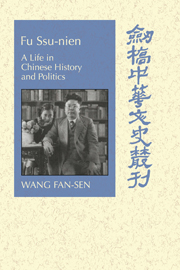Book contents
- Frontmatter
- Contents
- Acknowledgments
- List of Abbreviations
- Chronology
- Introduction: Fu Ssu-nien and Post-1895 Intellectual Trends
- 1 Fu Ssu-nien's Early Years
- 2 The Shaping of a New Historical School
- 3 Toward a Theory of Plural Origins of Chinese Civilization: Hypotheses on Ancient Chinese History
- 4 Contra-Introspective Moral Philosophy
- 5 The Burden of the May Fourth Mentality
- 6 Statism and the Later Days of a May Fourth Youth
- Conclusion: The Defeat of a May Fourth Youth
- Appendix I A Fragment from a Short Story Attacking Ku Chieh-kang
- Appendix II A Transcript of a Conversation between Fu Ssu-nien and Ch'en Pu-lei
- Glossary
- Bibliography
- Index
6 - Statism and the Later Days of a May Fourth Youth
Published online by Cambridge University Press: 01 February 2010
- Frontmatter
- Contents
- Acknowledgments
- List of Abbreviations
- Chronology
- Introduction: Fu Ssu-nien and Post-1895 Intellectual Trends
- 1 Fu Ssu-nien's Early Years
- 2 The Shaping of a New Historical School
- 3 Toward a Theory of Plural Origins of Chinese Civilization: Hypotheses on Ancient Chinese History
- 4 Contra-Introspective Moral Philosophy
- 5 The Burden of the May Fourth Mentality
- 6 Statism and the Later Days of a May Fourth Youth
- Conclusion: The Defeat of a May Fourth Youth
- Appendix I A Fragment from a Short Story Attacking Ku Chieh-kang
- Appendix II A Transcript of a Conversation between Fu Ssu-nien and Ch'en Pu-lei
- Glossary
- Bibliography
- Index
Summary
After the Marco Polo Bridge Incident, foreign aggression accelerated and liberals lost their moral high ground for criticizing their government. Fu was immediately invited to advise Chiang in Nanking on foreign affairs and was later handpicked by Chiang as a representative in the People's Political Council.
Maintaining a distance from politics was, as we have seen, a major feature of Chinese liberals of the May Fourth generation. Liberal members of this generation believed that culture and academic work should be given more importance in order to secure a more promising future for China. As the national crisis worsened, however, they soon found it difficult to maintain their earlier beliefs. Hu Shih lamented that the cultural ideals of the May Fourth movement were soon superseded by political realities as the danger of national subjugation approached. This change occurred despite Ts'ai Yüan-p'ei's insistence that “study is the way to save our country.” Many intellectuals agonized over whether they could make any substantial contribution to their imperiled country. The Mukden Incident raised serious questions in the minds of these scholars, and the Marco Polo Bridge Incident made these questions and doubts even more pressing.
Fu Ssu-nien and the IHP had long been criticized as unresponsive to social needs, if not political realities. Fears that their research was meaningless frequently appeared in the private correspondence between fellow members of the IHP.
- Type
- Chapter
- Information
- Fu Ssu-nienA Life in Chinese History and Politics, pp. 164 - 196Publisher: Cambridge University PressPrint publication year: 2000

